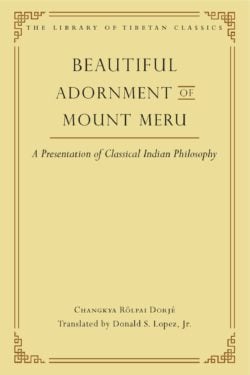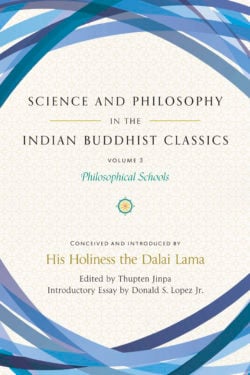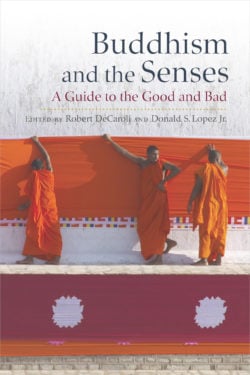Donald S. Lopez Jr.

Donald S. Lopez Jr. is the Arthur E. Link Distinguished University Professor of Buddhist and Tibetan Studies in the Department of Asian Languages and Cultures at the University of Michigan. He is the author of numerous monographs, translations, and edited volumes on South Asian Buddhism, Tibetan Buddhism, and the European encounter with Buddhism. In 2014 his Princeton Dictionary of Buddhism (with Robert Buswell) was awarded the Dartmouth Medal of the American Library Association for best reference work of the year. In 2000 he was elected to the American Academy of Arts and Sciences.
Books, Courses & Podcasts
Beautiful Adornment of Mount Meru
The lucid literary style of Beautiful Adornment of Mount Meru has made it a classic in the study of Indian philosophical thought, both in Tibetan monasteries and contemporary academic circles.
Beautiful Adornment of Mount Meru is a work of doxography, presenting the distinctive philosophical tenets of the Indian Buddhist and non-Buddhist schools in a systematic manner that ascends through increasingly more subtle views. It is a Tibetan corollary to contemporary histories of philosophy. The “Mount Meru” of the title is the Buddha’s teachings, and Changkya’s work excels in particular in its treatment of the two Mahayana Buddhist schools, the Yogācāra (here called the Vijñaptimātra) and the Madhyamaka. Beautiful Adornment is often praised for the clarity of its prose and its economical use of citations from Indian texts. It skillfully examines core philosophical issues, supplemented with several intriguing ancillary discussions, and draws heavily on the works of Tsongkhapa and his disciples in the Geluk tradition he founded.
Learn more about the Library of Tibetan Classics
Learn about becoming a benefactor of the Library of Tibetan Classics
Science and Philosophy in the Indian Buddhist Classics, Vol. 3
Deepen your understanding of meaning and truth with the third volume of the Dalai Lama’s esteemed series Science and Philosophy in the Indian Buddhist Classics.
In this third volume the focus turns to exploring the philosophical schools of India. The practice of presenting the views of various schools of philosophy dates back to the first millennium in India, when proponents of competing traditions would arrange the diverse sets of philosophical positions in a hierarchy culminating in their own school’s superior tenets. Centuries later, relying on the Indian Buddhist treatises, Tibet developed its own tradition of works on tenets (grub mtha’), often centered on the four schools of Buddhist philosophy, using them to demonstrate the philosophical evolution within their own tradition, and within individual practitioners, as they progressed through increasingly more subtle expressions of the true reality.
The present work follows in this venerable tradition, but with a modern twist. Like its predecessors, it presents the views of seven non-Buddhist schools, those of the Samkhya, Vaisesika, Nyaya, Mimamsa, Vedanta, Jaina, and Lokayata, followed by the Buddhist Vaibhasika, Sautrantika, Cittamatra, and Madhyamaka schools, arranging them like steps on a ladder to the profound. But rather than following in the sharply polemical approach of its ancient predecessors, it strives to survey each tradition authentically, relying on and citing the texts sacred to each, allowing the different traditions to speak for themselves. What, it asks, are the basic components of the world we experience? What is the nature of their ultimate reality? And how can we come to experience that for ourselves? See how the rich spiritual traditions of India approached these key questions, where they agreed, and how they evolved through dialogue and debate.
This presentation of philosophical schools is introduced by His Holiness and is accompanied by an extensive introduction and survey by Professor Donald Lopez Jr. of the University of Michigan, who is uniquely qualified to communicate the scope and significance of this literary and spiritual heritage to modern readers.
Explore the entire series here.
Buddhism and The Senses
Across Buddhist traditions, the five senses—sight, sound, smell, taste, and touch—are perceived both positively and negatively. Share eminent scholars’ fascination and deep insight into what makes a sensuous experience good or bad.
Following the exhibition Encountering the Buddha: Art and Practice across Asia at the National Museum of Asian art, ten eminent scholars present their insights into Buddhism’s fascinating relation with the five senses (sight, sound, smell, taste, and touch), which careens between delight and disgust, rarely finding a middle way. While much of Buddhist literature is devoted to overcoming the attachment that dooms us to rebirth in samsara, primarily by deprecating sense experience and showing that whatever brings us sensual pleasure leads only to all manner of physical and mental pain, in texts such as the Lotus Sutra, sensory powers do not offer sensory pleasure but rather knowledge, clear observation, and ability to preach the Dharma. Considering such religiously and historically contingent ambiguity, this volume presents each of the five senses in two instantiations, the good and the bad, opening up the discourse on the senses across Buddhist traditions.
Just as the museum departed from tradition to incorporate sensory experiences into the exhibition, this volume is a new direction in scholarship to humanize Buddhist studies by foregrounding sensory experience and practice, inviting the reader to think about the senses in a focused manner and shifting our understanding of Buddhism from the conceptual to the material or practical, from the idealized to the human, from the abstract to the grounded, from the mind to the body.
Includes essays by Bryan J. Cuevas, Debra Diamond, D. Max Moerman, Reiko Ohnuma, James Robson, Melody Rod-ari, Kurtis R. Schaeffer, John Strong, and Lina Verchery.



